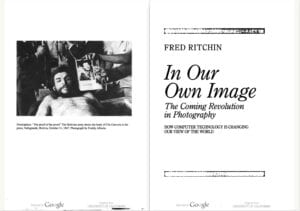
Ritchin argues that the traditional understanding of photography as a record of reality is being challenged by the increasing use of digital manipulation and the blurring of the line between reality and simulation. He also explores the potential for photography to be used in new and innovative ways to address social and political issues.
Ritchin defines “Fluidity of the Digital” as the significant ease of editing and speedy transmission of digital photos as a result of their being reorganized into distinct elepixels in the computer. Photography, which has been traditionally mythologized as a quasi and trustworthy medium, is now reduced to an early sketch that was frequently revised. When digital photography reached the end of its transitional stage of faking the former appearance of objectivity, it could consciously embrace the wider discourse of opinion. He describes the “fluidity of the digital” as the ability of digital technologies to manipulate and modify images in ways that were before impractical. The distinction between fact and fiction is increasingly porous and changeable thanks to the ease with which digital images may be mixed, edited, and manipulated.

Virtual reality, which enables users to enter and interact with entirely digital surroundings, is a prime example of the fluidity of the digital. By enabling novel and immersive experiences that were previously unattainable, virtual reality has the potential to muddle the distinction between reality and simulation. VR headsets, for instance, can take users to virtual worlds that resemble real places or provide wholly fanciful settings. Users can interact with things and other people in these virtual environments in ways that feel authentic despite the fact that they are purely digital.
In my opinion, digitalization has made photography technology more diversified, but I still think that photos don’t lie, photos are just a carrier for the expresser, and the objects captured in photos are real and exact. But photographers will lie, they will use various light and shadow angles, light and dark matches, etc. to express their views, and this may be tricky.